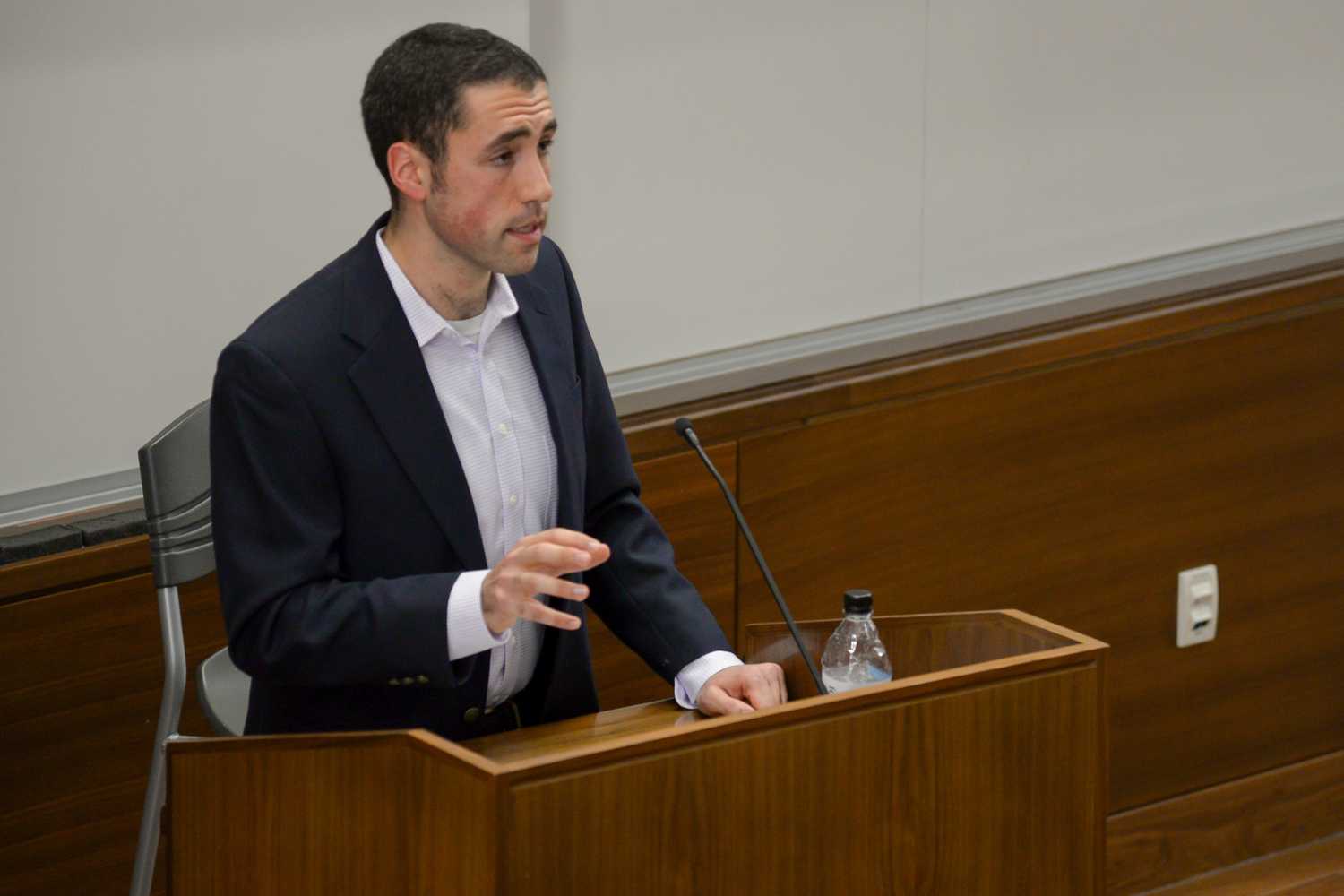Scott Stern discusses American Plan legacy


Pittsburgh native Scott Stern discusses the history of the government-funded “American Plan” program in the Pitt Public Health building Thursday evening.
The idea of an “American Plan” might invoke patriotic imagery like Uncle Sam and fireworks on the Fourth of July. But the term refers to a set of strategies that led to the systematic oppression and incarceration of women thought to have sexually transmitted infections in the 1920s.
That’s what Scott Stern, a Pittsburgh native and author of “The Trials of Nina McCall: Sex, Surveillance, and the Decades-Long Government Plan to Imprison ‘Promiscuous’ Women,” discussed at the first lecture in the spring series on the medical humanities Thursday night at the Public Health Building. The building was named after former U.S. Surgeon General Thomas Parran until June 29, 2018, when the Pitt Board of Trustees voted to officially change its name.
“[Parran] was deeply, personally involved,” he said. “I found hundreds of letters, memos, speeches, radio addresses that he gave where he discussed the American Plan. I also found a lot of this in his papers here at Pitt.”
The American Plan was a 1910-50 government-funded program that allowed government officials to detain women that they reasonably suspected had STIs or were promiscuous. Stern argued the phrasing “reasonable suspicion” was purposefully vague so officials could abuse their power by claiming in some cases women were detained who refused to have sex with them or pay them off.
“Basically, reasonable suspicion enabled officials to obtain any woman that they wanted,” Stern said.
When government officials screening soldiers during World War I noticed that a number of the men in training camps had either syphilis or gonorrhea, they thought the transmission of STIs was mainly the fault of women — which is false, Stern said, instead arguing that the American Plan was more of a reaction to growing female empowerment. He cited examples such as the beginning of formal education for women, the suffragette movement and the growth of divorce rates.
“On its face, this would appear to be a response to World War I, but that isn’t the whole story because if it were just a response to the war, the American Plan would have stopped at the end of World War I,” he said. “But it didn’t.”
In telling the story of the American Plan, Stern felt it was important to share the voices of those who were affected firsthand. Much of Stern’s research — and eventually his book — focused on a young woman named Nina McCall’s trial in the early 1900s.
McCall was 18 years old in 1918 when she was approached by the local deputy sheriff in rural Michigan when she was leaving the post office with her mother. The officer told McCall to report to the local health officer for a medical exam, where she was told she was slightly infected with gonorrhea.
But McCall was sure she didn’t have the STI and she called the officer a liar to his face, insisting that she had never had intimate relations with a man.
“It is hard to overstate just how bold a young woman would have had to have been in the year 1918 to call a male authority figure a liar to his face,” Stern said.
Women of color, specifically African American women, were disproportionately targeted. According to Stern, officials justified this through false information, like claiming that African American people were anatomically more likely to transmit syphilis.
Detained women were often forced into gynecological exams, even though there was a 25 percent false positive rate at the time, according to Stern. Women who tested positive for STIs were placed into detention hospitals or reformatories, where they were forced to do labor. They were not given due process and were, as a result, imprisoned for an unspecified amount of time.
“A woman could be imprisoned in a detention hospital or reformatory basically a penal institution, which some women did call concentration camps,” Stern said.
In these hospitals and reformatories, women faced ineffective and often fatal treatments of mercury shots and arsenic-based drugs. Stern emphasized that these treatments did not cure the disease as they were intended to.
“There is limited evidence that mercury will kill the microbe, but it doesn’t cure the condition. What mercury and the ingestion of arsenic will do though is kill you and, in the process, hurt a tremendous amount,” Stern said.
Stephanie Eckstrom, a grad student studying sociology, appreciated the level of detail to which Stern went to find the voices of the women victimized.
“[I’m] especially impressed with his emphasis on the original voices by seeking testimony in courts,” Eckstrom said.
Eleanor Feingold, senior associate dean of the graduate school of public health, spoke to the importance of having Stern discuss his research, through the lens of public health issues both past and present.
“It is very relevant to public health obviously, and to the history of what has been bad and good in public health and the ethical lessons we want to learn from history,” Feingold said.
And since his speech took place in a building previously named for someone highly involved in this aspect of American history, Stern emphasized how important it is to learn medical ethics through mistakes made in history.
“No one is saying we should forget Parran. Indeed, I’m here talking about him today. I think Pitt and other schools should continue to teach his life and his legacy — the good as well as the bad,” Stern said.
Recent Posts
‘He’s off to a much faster and better start’: Republicans reflect the second Trump administration’s first two months
Since Inauguration Day Trump’s second term has caused division amongst young Americans. Despite these controversies,…
Who Asked? // Why do we accept bad treatment from people?
This installment of Who Asked? by staff writer Brynn Murawski attempts to untangle the complicated…
What, Like It’s Hard? // Lean on your people
Contributing editor Livia LaMarca talks about leaning on your support networks and gives advice on…
Note to Self // Hot Girl Summer
In the sixth edition of Note to Self, Morgan Arlia talks about how she is…
A Good Hill to Die On // Down to Date and Time
In the latest version of “A Good Hill to Die On,” staff writer Sierra O’Neil…
‘Dress for Success: Closet to Career’ alleviates the stress of building a professional wardrobe
As the end of the spring semester rapidly approaches, many Pitt students find themselves in…

